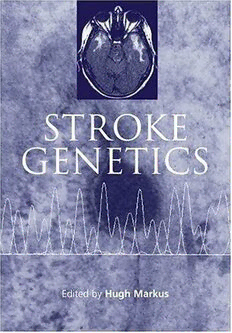
Stroke Genetics PDF
363 Pages·2003·3.026 MB·English
Most books are stored in the elastic cloud where traffic is expensive. For this reason, we have a limit on daily download.
Preview Stroke Genetics
Description:
Stroke should be thought of as a syndrome, or collection of disease processes, rather than a single disease. It is characterised by restriction of blood flow to the brain and is responsible for imposing a very significant burden on healthcare systems, accounting for more than four million deaths per year. It can be directly linked to the majority of adult neurological disability as well as contributing to vascular dementia, the second most common cause of dementia after Alzheimer's Disease.Despite its importance on a population basis, research into the genetics of stroke has lagged behind many other disorders; however, the situation is changing and there is now growing evidence that genetic factors are important in the stroke risk, often acting via interactions with conventional risk factors.This book will provide an introduction to the field of stroke genetics, covering the general principles of genetic research and the epidemiology of stroke, before discussing the details of monogenic and polygenic disorders and the full range of cerebrovascular diseases, including ischaemic stroke, primary intra-cerebral haemorrage and vascular malformation, and subarachnoid haemorrage and intra-cerebral aneuyrisms. The book concludes by describing a practical approach to investigating patients with stroke for underlying genetic disorders, including an introduction to genetic counselling. There is also a list of useful websites.This will be essential reading for all clinicians treating stroke patients, neurologists and researchers in the field of cerebrovascular disease.
See more
The list of books you might like
Most books are stored in the elastic cloud where traffic is expensive. For this reason, we have a limit on daily download.
